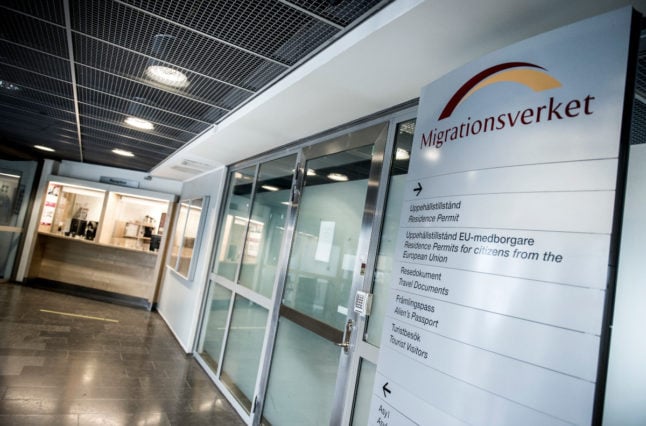James, who asked us not to use his surname, had been successfully receiving parental benefits, child benefits and sick pay for nine months, so didn’t realise until August last year that there were any issues with his residency.
“I realised there was an issue when I applied for parental leave around August time,” he told The Local. “I was denied it, and I didn’t know why.”
“So then I rang up the Migration Agency to ask if there was an issue at their end with the application for parental leave, and they said ‘you’ve been staying here illegally for nine months’. I was shocked.”
‘I made a huge mistake’
James was well aware of the deadline for applying for post-Brexit residency to secure his rights to live in Sweden under EU law, but he thought his ongoing application for citizenship, which he submitted well in advance of the Brexit deadline, meant he had the right to stay while his application was being processed.
“I made a huge mistake by not renewing my residency,” he said. “I completely understand I made a mistake.”
“I was under the impression that if I applied for citizenship, and the application was in process, that that would be enough. I just assumed that I’m in the system and I’m waiting for an answer. And naively, I did that and it was the wrong decision.”
Although he is well aware that he made a mistake, James also found it difficult to know exactly what kind of residence document he should have applied for.
“It was hard to get a clear answer what to apply for,” he said. “I understand Brexit is new and no one really knows what to do really. But people have told me to apply for one thing, and I speak to another case worker and they say ‘nej, nej‘ apply for this instead.”
‘No one said anything’
James never realised he was staying in Sweden illegally, as he had not had any issues crossing the border or with parental leave and child benefit payments since the Brexit deadline passed.
“I’ve gone over the border two or three times while I was an illegal immigrant, not knowingly, but while my permit was no longer valid, but no one said anything,” he said. “I was at the passport queue and they just checked it and said ‘varsågod’, no questions.”
In fact, the Migration Agency only realised he was living in the country illegally when James called them.
He was advised by one member of staff at the Migration Agency to “go off the radar”, while his residence permit application was processing, he said, and was warned that he would be unable to re-enter Sweden if he did return to the UK.
“I just thought ‘if I continue to work and crash the car, what rights do I have?’.”
“All all these thoughts are going in my head like ‘what can I do?’ I need to earn money, but I shouldn’t work and I’ve got no rights and I’m still paying for insurance. Does that still apply if I have an accident, but no rights to be here?”
The Local has contacted Sweden’s Migration Agency for comment, but has not yet received a response.
May no longer qualify for citizenship
Brits staying in Sweden under EU rules prior to Brexit had to apply for post-Brexit residence permits to secure their rights to live in Sweden, even if they had already applied for citizenship.
The Migration Agency wrote the following on its website, under “Residence status for British citizens”: “If you have applied for Swedish citizenship but have not yet received a response, you need to legalise your stay in Sweden. You can do this by applying for a permit on some other basis, while waiting for a response in your citizenship case.”
It further states that: “If you have applied for residence status before December 31st, 2021, but have not yet received a response to this case, you have the right to live, work and study in Sweden until your case is concluded”.
Now, James’ confusion over the rules for post-Brexit residency could mean that his application for citizenship is denied, despite him fulfilling all the requirements when he applied.
“I can’t have citizenship without permanent residency,” he said. “So once I no longer had that, I had to put a pause on the citizenship.”
Luckily for James, his partner is Swedish, so he was able to apply for a non-EU residence permit (uppehållstillstånd) to move to Sweden and live with a Swedish citizen.
EDITOR’S PICK:
After our interview, James found out that he had been granted a two-year temporary residence permit, meaning he will first be eligible for a permanent residence permit under the current rules in just under four years, at the earliest.
This means, if no changes to requirements for citizenship are made within the next four years, he will have been in Sweden for 15 years before he is once again eligible to apply for citizenship.
Talking to Swedish friends and family about the situation, James said that they have been “very supportive and understanding,” and have found the whole situation unbelievable, reassuring him det löser sig, ‘it will all work out’.
“I’ve been stressed, frustrated and angry and now it just feels like a joke that it’s gotten this far,” he said. “All the emotions basically.”
Lack of communication
James was also surprised at the lack of communication between different government agencies in a country with a personal number system.
He was baffled that he had to provide information on his marriage and his wage history to the Migration Agency, for example, despite other Swedish authorities already having a record of this information.
“It’s as if I’ve never been in the country,” James said. “I’ve had to send all my background and give them proof that I’m married, even though we did it in Sweden, and my history of wages, even though I’ve been here for over 10 years.”
“It feels like it could have been so resolved so simply by entering in my personal number and talking to Skatteverket (the tax agency). They could have seen I’ve been here 11 years and have two children and things like that.”
‘It was hard to accept that I couldn’t go to my grandmother’s funeral’
James said that, like many of our readers waiting for work or residence permits to be approved, one of the hardest things was being unable to travel home.
“All I wanted to do was be around my family and have a cup of tea and just air it off, just talk about it, and I couldn’t do that,” he said.
His residency issue also meant he was unable to visit his grandmother, who he described as “the hub of the family” when she became sick, and couldn’t attend her funeral when she sadly passed away.
“That is what I wanted to do more than anything. And I didn’t get to see her when she was sick. And then she passed and I couldn’t go to the funeral. That was hard to accept, really.”



 Please whitelist us to continue reading.
Please whitelist us to continue reading.
Member comments